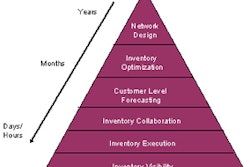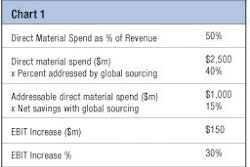Singapore — November 22, 2006 — Companies' increasing preferences to outsource their logistics functions to third-party logistics service providers is fueling demand for 3PL services in India, with the market set to nearly quadruple in the next six years, according to a new report from Frost & Sullivan.
"With the opening up of the Indian economy to foreign companies, entrants may not consider it a very viable option investing in logistics infrastructure. Hence, they are likely to outsource their logistics operations in the country to a 3PL service provider," said Frost & Sullivan Research Associate Deepak Mohan.
"Moreover, companies entering the country may not be conversant with the complex business and tariff laws, and so they require a 3PL service provider with a grasp on such aspects," Mohan added
Still Nascent
New analysis from Frost & Sullivan, "Strategic Analysis of the Third Party Logistics Markets in India," finds that this market earned revenues of $890.3 million in 2005 and is likely to reach $3.56 billion in 2012.
The overall 3PL market is still at a nascent stage in India. Sectors such as automotive and IT hardware and electronics have seen a greater acceptance of 3PL, with the concept of end-to-end outsourcing becoming increasingly popular as companies realize its advantages. In contrast, sectors such as pharmaceuticals and fast-moving consumer goods (FMCG) have a relatively low penetration of 3PL services due to strained profit margins.
Mohan noted that there is an increasing trend toward outsourcing of logistics operations of a company to professional 3PL service providers. "This is a positive trend for the 3PL service providers, and it is taking place because companies have realized the importance of concentrating on their core competencies, leaving logistics to the experts," he said.
Services May Vary
Mohan added that the level of outsourcing of services may vary between industrial sectors, with some of the companies opting for either a partial or a full service depending on the need.
The repealing of the present sales tax system and the adoption of a uniform national value-added tax (VAT) system are likely to reorganize the existing decentralized distribution models into more centralized zones. "This could result in the considerable growth of a number of large zonal warehousing hubs managed by 3PLs, facilitating efficient distribution of goods," Mohan said.
"Strategic Analysis of the Third Party Logistics Markets in India" examines major market drivers, restraints and industry challenges, and it provides revenue forecasts and end-user analyses.
"With the opening up of the Indian economy to foreign companies, entrants may not consider it a very viable option investing in logistics infrastructure. Hence, they are likely to outsource their logistics operations in the country to a 3PL service provider," said Frost & Sullivan Research Associate Deepak Mohan.
"Moreover, companies entering the country may not be conversant with the complex business and tariff laws, and so they require a 3PL service provider with a grasp on such aspects," Mohan added
Still Nascent
New analysis from Frost & Sullivan, "Strategic Analysis of the Third Party Logistics Markets in India," finds that this market earned revenues of $890.3 million in 2005 and is likely to reach $3.56 billion in 2012.
The overall 3PL market is still at a nascent stage in India. Sectors such as automotive and IT hardware and electronics have seen a greater acceptance of 3PL, with the concept of end-to-end outsourcing becoming increasingly popular as companies realize its advantages. In contrast, sectors such as pharmaceuticals and fast-moving consumer goods (FMCG) have a relatively low penetration of 3PL services due to strained profit margins.
Mohan noted that there is an increasing trend toward outsourcing of logistics operations of a company to professional 3PL service providers. "This is a positive trend for the 3PL service providers, and it is taking place because companies have realized the importance of concentrating on their core competencies, leaving logistics to the experts," he said.
Services May Vary
Mohan added that the level of outsourcing of services may vary between industrial sectors, with some of the companies opting for either a partial or a full service depending on the need.
The repealing of the present sales tax system and the adoption of a uniform national value-added tax (VAT) system are likely to reorganize the existing decentralized distribution models into more centralized zones. "This could result in the considerable growth of a number of large zonal warehousing hubs managed by 3PLs, facilitating efficient distribution of goods," Mohan said.
"Strategic Analysis of the Third Party Logistics Markets in India" examines major market drivers, restraints and industry challenges, and it provides revenue forecasts and end-user analyses.














